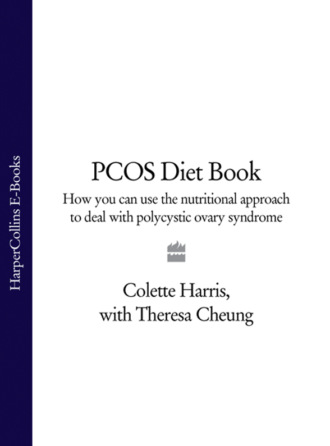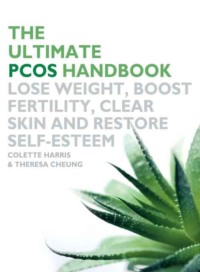
Полная версия
PCOS Diet Book: How you can use the nutritional approach to deal with polycystic ovary syndrome

THE PCOS DIET BOOK
HOW YOU CAN USE
THE NUTRITIONAL APPROACH
TO DEAL WITH
POLYCYSTIC OVARY SYNDROME
Colette Harris
and Theresa Cheung

Copyright
While the authors of this work have made every effort to ensure that the information contained in this book is as accurate and up to date as possible at the time of publication, medical and pharmaceutical knowledge is constantly changing and the application of it to particular circumstances depends on many factors. Therefore it is recommended that readers always consult a qualified medical specialist for individual advice. This book should not be used as an alternative to seeking specialist medical advice, which should be sought before any action is taken. The authors and publishers cannot be held responsible for any errors and omissions that may be found in the text, or any actions that may be taken by a reader as a result of any reliance on the information contained in the text, which is taken entirely at the reader’s own risk.
Thorsons Element
An imprint of HarperCollinsPublishers 1 London Bridge Street London SE1 9GF
www.harpercollins.co.uk
Thorsons is a trademark of HarperCollinsPublishers Limited
Published by Thorsons 2002
© Colette Harris and Theresa Cheung 2002
Colette Harris and Theresa Cheung assert the moral right to be identified as the authors of this work
A catalogue record for this book is available from the British Library
All rights reserved under International and Pan-American Copyright Conventions. By payment of the required fees, you have been granted the nonexclusive, nontransferable right to access and read the text of this ebook on-screen. No part of this text may be reproduced, transmitted, downloaded, decompiled, reverse engineered, or stored in or introduced into any information storage and retrieval system, in any form or by any means, whether electronic or mechanical, now known or hereinafter invented, without the express written permission of HarperCollins e-books.
HarperCollinsPublishers has made every reasonable effort to ensure that any picture content and written content in this ebook has been included or removed in accordance with the contractual and technological constraints in operation at the time of publication.
Source ISBN: 9780007131846
Ebook Edition © FEBRUARY 2016 ISBN: 9780007386215
Version: 2016-01-07
Contents
Cover
Title Page
Copyright
Foreword
Introduction
Part 1 Nutritional Healing for PCOS – Laying the Foundations
Chapter 1 Why Food is so Important for Women with PCOS
Chapter 2 Your PCOS Diet
Chapter 3 The PCOS Detox Boost
Chapter 4 Your Sample Menu and Recipes
Part 2 Tackling Your Problems
Chapter 5 Fine-tuning Your Diet to Beat PCOS Symptoms
Chapter 6 Adapting Your Diet for Your Health – When You Have PCOS and Diabetes, Thyroid Problems or Digestive Disorders
Chapter 7 Losing Weight – Breaking the PCOS Cycle
Chapter 8 A to Z of Useful Supplements and How to Use Them
Part 3 Prepare for Success: Motivation, Support and a Healthy Attitude to Food
Chapter 9 Getting Motivated for Change
Chapter 10 Set Yourself Up for Success
Chapter 11 Healing Your Emotional Relationship with Food
Chapter 12 Support and Information: Useful Addresses and Websites
Keep Reading
Appendix PCOS – Causes, Symptoms, Treatment
Suggested Reading
References
Index
Acknowledgements
Also by the Author
About the Publisher
Foreword
We now know that PCOS is a common condition that must have plagued women for generations. Only a decade ago it was barely recognized by medical practitioners, and most women would have suffered their symptoms in silence. At last, with greater understanding of its underlying causes, PCOS is now being taken seriously. Much of the credit for greater public awareness in the UK goes to Colette Harris and her previous book PCOS: A Woman’s Guide to Dealing with Polycystic Ovary Syndrome and for her tireless support for Verity, the PCOS support group.
As a scientist, nutritionist and medical herbalist I am impressed by how far Colette Harris and Theresa Francis-Cheung have delved into the scientific and medical literature to review what is currently known about PCOS and its treatment. In this book they present the information in an easy-to-read form, together with the voices of PCOS sufferers, with whom many women will identify. Sufferers can now see a rational basis for their diverse symptoms, founded on poor utilization of insulin. For example, this new concept goes a long way to explain why weight loss is so difficult for women with PCOS.
But help is at hand!
This book is full of tips on diet and lifestyle changes that can help the body to use insulin more efficiently. It shows how the vicious cycle of weight gain, with increasing difficulty of weight loss, can be broken, and that the debilitating and embarrassing signs and symptoms of PCOS really can disappear.
There is no doubt that, both from clinical data and from my own experience as a practitioner, switching to a healthy diet and adopting a healthy lifestyle would make a huge difference to the well-being of many people in the Western world. However, even with due attention to diet, many women do not reach their recommended target intakes for vitamins and minerals while on weight-reducing regimes. This is the dilemma faced by many women with PCOS, and is where nutrient supplements can be so very helpful. While they should never be a substitute for healthy eating, vitamin and mineral nutrition supplements can be used in conjunction with a good diet to ensure optimal nutrition of the key organs of the body involved in hormone balance.
Valuable guidance is given in this book on appropriate nutrient supplements, together with herbs that may be used to speed the way to health. However, since sufficient detail on the use of herbs cannot be conveyed in a book such as this, women with PCOS would benefit greatly from consulting a professional. If you want to consult a Medical Herbalist, look for the qualifications MNIMH or FNIMH (Member or Fellow of the National Institute of Medical Herbalists, UK) or MCPP (Member of the College of Practitioners of Phytotherapy, UK). These practitioners have had four years of rigorous medical training and will give sympathetic advice on PCOS. The addresses of these organizations are given at the back of the book.
There is no need to suffer in silence these days – if you have PCOS you can choose to have health and well-being. Although it will involve some effort, by following the advice given in this book you can make a positive difference to your own health and take control of your life again. It is an excellent guide to our current state of knowledge and is written from an integrated medical perspective by an ex-sufferer.
Dr Ann Walker PhD MNIMH MCPP
Senior Lecturer in Human Nutrition
Hugh Sinclair Unit of Human Nutrition School of Food Biosciences
The University of Reading, UK
27 September 2001
Конец ознакомительного фрагмента.
Текст предоставлен ООО «ЛитРес».
Прочитайте эту книгу целиком, купив полную легальную версию на ЛитРес.
Безопасно оплатить книгу можно банковской картой Visa, MasterCard, Maestro, со счета мобильного телефона, с платежного терминала, в салоне МТС или Связной, через PayPal, WebMoney, Яндекс.Деньги, QIWI Кошелек, бонусными картами или другим удобным Вам способом.



